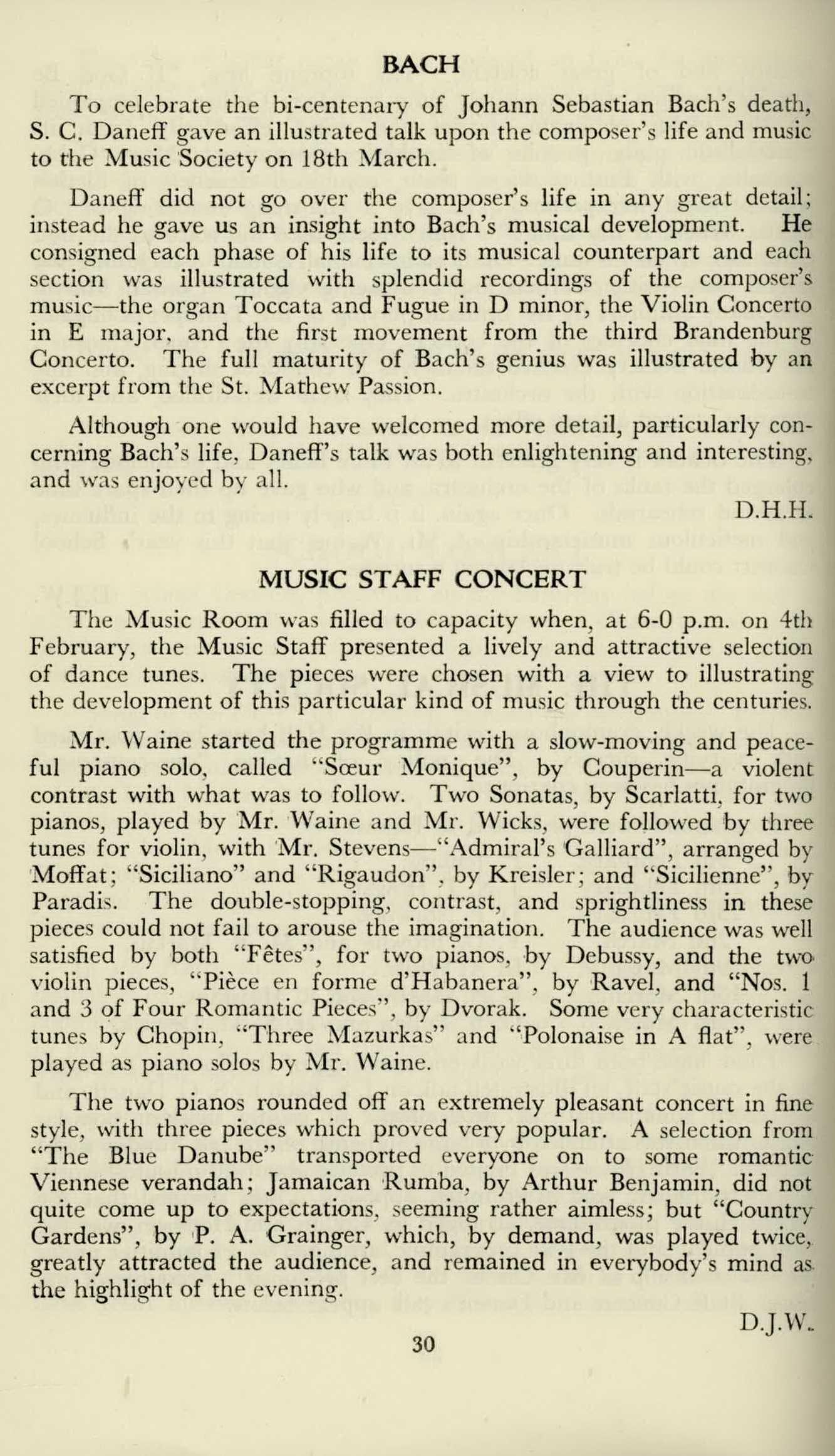
3 minute read
The Musical Society
from June 1950
by StPetersYork
beauty, and of great content. The soprano aria, "If God Be For Us"—which was exquisitely sung by Mary Collier, accompanied by the violin obbligato—carries the mind effortlessly from its materialistic plane to one of aesthetic conception. Mary Cobb, contralto, with 'Eustace Piers, tenor, combined clearness of diction with personal interpretation, to give a charming rendering of "0 Death, 'Where is thy sting?" Tom Moore used his voice to the best advantage when he sang "The Trumpet Shall Sound"—including the second part—with clearness and convincing vigour. Conrad Martin won many admirers by his brilliant playing of the Trumpet obbligato. In the final choruses of the concert, especially the "Amen Chorus", the Choral Society excelled themselves in confident singing, and fine co-ordination with the orchestra. They were well-drilled, and their phrasing created a sharp effect.
The School is very grateful to all those ladies and gentlemen who enlarged the ranks of the orchestra, and who gave up their spare time to attend rehearsals. Once again, it is largely owing to the influence, and meticulous musicianship of Mr. Waine, that this year's School Concert could be truly acclaimed a success.
D.J.W.
The weekly gramophone recitals in Big Hall have been continued with varying success. The policy of having "one-composer" programmes has been continued.
Programmes were presented as follows :— 9th February. 16th February. 23rd February. 2nd March. 9th March. 16th March. 23rd March. P. Jenkins. J. N. T. Howat. D. P. Norwood. F. D. Browne and M. B. Markus. D. A. White. D. A. 'Haxby and R. Hawkins. G. B. Pullan and H. S. M. Dewick.
There have been three week-end meetings of the Society, a concert by the music staff, an illustrated talk on J. S. Bach by S. C. Daneff, and a "record roundabout" of programmes of mostly modern popular music which was attended by a large audience on the last Sunday night of term. Each House was invited to produce about 20 minutes' worth of entertainment, and after much applause it was decided that the School House programme, arranged by Collins and Hodgson, was the most popular and the Rise programme, arranged by a committee under the chairmanship of Mr. Crews, the best produced. Accounts of the Music Staff Concert and Daneff's talk appear below.
BACH
To celebrate the bi-centenary of Johann Sebastian Bach's death, S. C. Daneff gave an illustrated talk upon the composer's life and music to the Music Society on 18th March.
Daneff did not go over the composer's life in any great detail; instead he gave us an insight into Bath's musical development. He consigned each phase of his life to its musical counterpart and each section was illustrated with splendid recordings of the composer's music—the organ Toccata and Fugue in D minor, the Violin Concerto in E major. and the first movement from the third Brandenburg Concerto. The full maturity of Bach's genius was illustrated by an excerpt from the St. Mathew Passion.
Although one would have welcomed more detail, particularly concerning Bach's life, Daneff's talk was both enlightening and interesting, and was enjoyed by all.
D.H.H.
MUSIC STAFF CONCERT
The Music Room was filled to capacity when, at 6-0 p.m. on 4th February, the Music Staff presented a lively and attractive selection of dance tunes. The pieces were chosen with a view to illustrating the development of this particular kind of music through the centuries.
Mr. Waine started the programme with a slow-moving and peaceful piano solo, called "Scour Monique", by Couperin—a violent contrast with what was to follow. Two Sonatas, by Scarlatti, for two pianos, played by Mr. Waine and Mr. Wicks, were followed by three tunes for violin, with Mr. Stevens—"Admiral's Galliard", arranged by 'Moffat; "Siciliano" and "Rigaudon", by Kreisler; and "Sicilienne", by Paradis. The double-stopping, contrast, and sprightliness in these pieces could not fail to arouse the imagination. The audience was well satisfied by both "Fetes", for two pianos, by Debussy, and the two violin pieces, "Piece en forme d'Habanera", by Ravel, and "Nos. 1 and 3 of Four Romantic Pieces", by Dvorak. Some very characteristic tunes by Chopin, "Three Mazurkas" and "Polonaise in A flat", were played as piano solos by Mr. Waine.
The two pianos rounded off an extremely pleasant concert in fine style, with three pieces which proved very popular. A selection from "The Blue Danube" transported everyone on to some romantic Viennese verandah; Jamaican Rumba, by Arthur Benjamin, did not quite come up to expectations, seeming rather aimless; but "Country Gardens", by P. A. Grainger, which, by demand, was played twice, greatly attracted the audience, and remained in everybody's mind as the highlight of the evening.

30 D. J.W.










